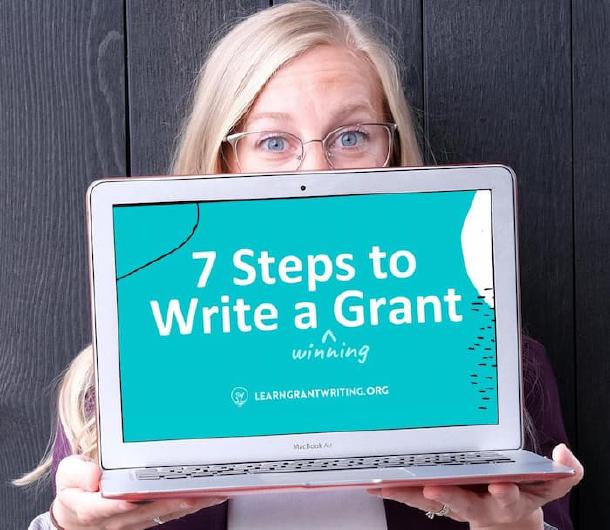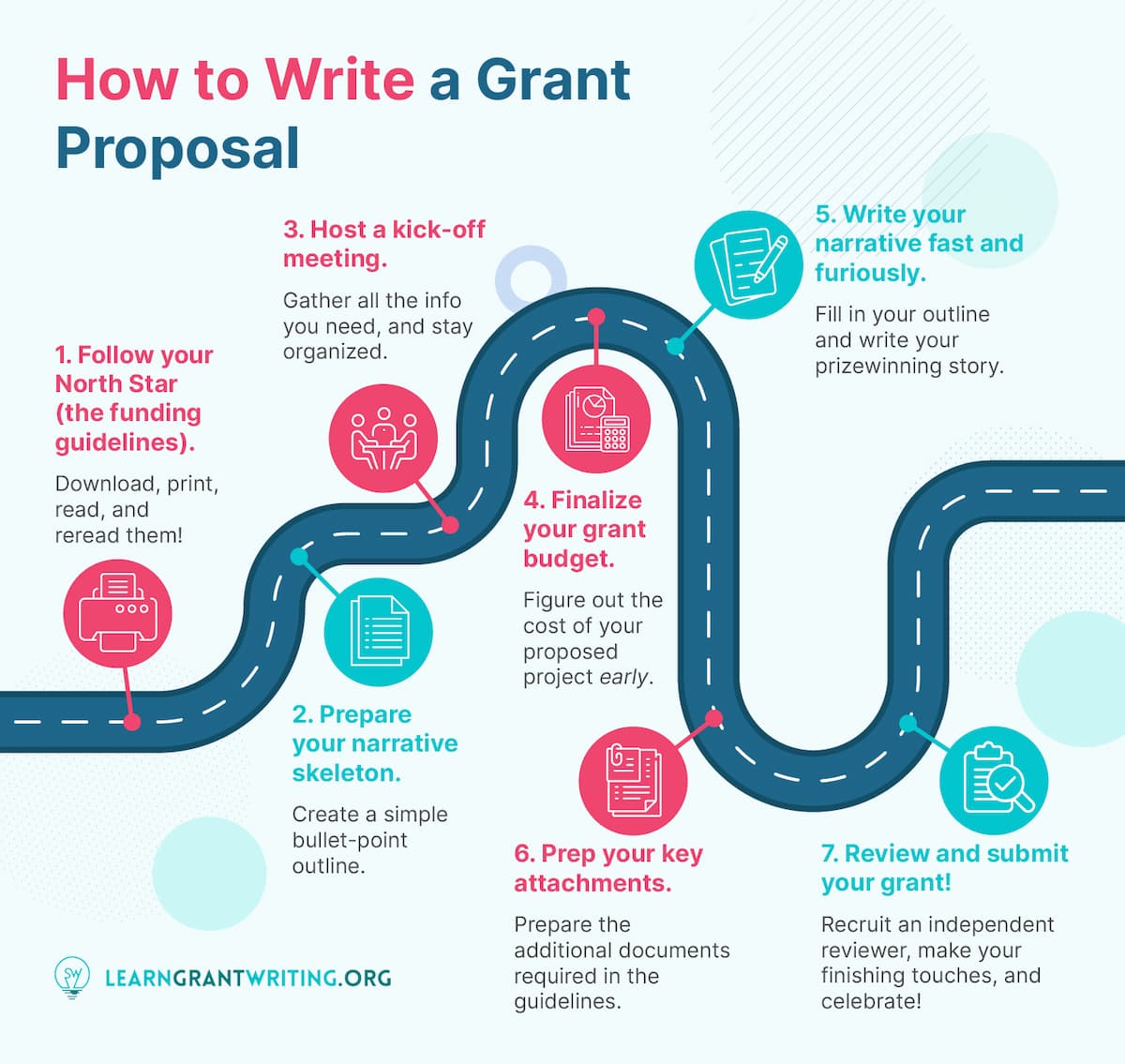Have you been thrown into the deep end working at a nonprofit organization and tasked to apply for grant funding for the first time? Maybe you've heard about the field, catching the buzz from a friend starting a grant writing side hustle. Or you've seen how others have pivoted their careers to launch grant writing consultant businesses.
However you found grant writing, we're glad you're here!
Grant writers are perceived to have superpowers—they know how to get free money!
Well, it's not quite that easy. There is no such thing as free money, and grant writing is a lot of hard work.
However, it is very learnable and an incredible skill set to have in your quiver. Even newcomers succeed with the right guidance and training under their belt.
This crash course in grant writing will cover everything you need to know to start approaching grant writing like a boss!
- Grant Writing Essentials: Definitions & FAQs
- Grant Writing vs. Nonprofit Fundraising
- The Grant Writing Process for Beginners
- Understanding the Grant Fundraising Landscape
- Why Grant Writing is Such a Valuable Skill
Curious about how to get into grant writing without prior experience? Check out this video to learn more.
Grant Writing Essentials: Definitions & FAQs
Let’s start with the essentials: a few grant writing definitions and frequently asked questions.
What is grant writing?
Grant writing is the process of crafting a written proposal to receive grant funding from a grant making institution in order to fund a program or project.
Grant writing involves laying out your case for why the grant will do the most good for you (or your project or organization). A stellar grant proposal will clearly show the funder that your plan is the best possible choice for accomplishing your shared goals.
Think of grant writing like making a pitch to investors or lenders but to receive funding that you won’t need to pay back.
That begs the question…
What are grants?
A grant is a financial award to support a person, organization, project, or program. It is intended to achieve a specific goal or purpose. Nonprofits can use grants to complete projects, run programs, provide services, or continue running a smooth operation.
Great, now where is all of this money coming from?
Who provides grant funding?
Typically, grants are awarded to organizations from grant making institutions (also called grantors). These include foundations, corporations, and government agencies.
Grantors provide grants to help further their goals in their communities (or around the country or world) and to support other organizations that do on-the-ground work. These goals are typically philanthropic or social in nature, but grants might also be offered for educational, scientific, or any other purpose.
Grants usually come with very specific guidelines for what the money can and can’t be used for, as well as rules for how the “winner” of the grant (or the grantee) will report on its progress. When a grant has specific guidelines, we call these funds restricted. Restricted funding means they can only be used for the purposes laid out in the proposal and specified by the funder.
So, can anybody and everybody get grant money?
Who is eligible for grant funding?
Many different types of organizations are eligible to write proposals and apply for grant funding. Most notably, 501(c) nonprofit organizations that have IRS Letters of Determination (basically any type of legit nonprofit).
More specifically, these types of organizations are eligible for grants through grant writing:
- Nonprofits/public charities with IRS-recognized status
- Unincorporated community groups with fiscal sponsors
- Tribal organizations (and sometimes housing authorities)
- Faith-based organizations (which sometimes must provide direct social services depending on the grantor’s guidelines)
- Local governments
Exciting, right? Grants can do a lot of good for organizations of all sizes. But who’s doing the work?
Who does the actual grant writing and drafts the proposal?
All different kinds of folks! Each organization finds their sweet spot for getting the work done. Grant proposals can be written by:
- Employees of eligible organizations
- Volunteers lending their time
- Freelance grant writers providing a contract-based service
- Grant writing consultants who provide organizations with ongoing help through retainer contracts
Successful grant writing leads to positive impacts on real people and real communities. Grant writers put in the elbow grease because they care about charitable organizations and their missions. They want to see their communities thrive.
How do you learn grant writing?
Grant writing is a set of specific skills and processes, so it can be taught and learned like any other subject.
There are a few different avenues you can explore to level up your grant writing skills.
- DIY Method: You can binge-watch YouTube content to pick up the bits and pieces of grant writing. This is certainly a cost-effective method! However, factoring in the stress of reinventing the wheel while riding the struggle bus of going it alone, you’re spending more time (and $$) in the long run to learn grant writing skills.
- Higher-Ed Programs: Several universities offer certifications in nonprofit management, but most do not focus solely on grant writing. For a semester or two, the curriculum will teach you the ins and outs of nonprofit organizations, which includes grant writing. These courses include a university certificate for formal education. The downside, however, is that university programs fall short of helping students bridge the gap between learning the material and actually applying it—in other words, getting paid tp use your newly acquired knowledge in the field.
- Online Courses: There’s a wide variety of online courses to help you learn how to become a grant writer. Online education is flexible for those who are looking to add grant writing as a new skill set on top of a full-time schedule (life, work, etc.) or level up their skills. Yes, even if you’re an in-house grant writer working with a nonprofit organization, professional training is applicable. You can check out a roundup of the best grant writing classes here.
Curious about how to break into grant writing without prior experience and with no added debt? The Global Grant Writers Collective is the only program of its kind to show you how to be a world-class grant writer while also building a flexible, fulfilling life you love.
Grant Writing vs. Non Profit Funding
We’ve covered all the basics, but there’s a bit more important context to understand as you launch your grant writing journey.
You know that grants provide funding to organizations to do good work in their communities, but how does this relate to the bigger concept of fundraising?
TL;DR — Grant Writing vs. Fundraising
Fundraising is how you raise money for your organization. Grant writing is one type of fundraising activity. Grant writing includes asking foundations or government entities for support while other fundraising activities usually target individual donors.
What is nonprofit fundraising?
Fundraising is generally defined as the process of soliciting financial support for a cause or project.
Central to the idea of fundraising is the collection of cash donations (although all kinds of assets can be donated). Donations can be collected immediately or over months or years, as is the case for long-term pledges of large donations to capital campaigns.
Fundraising is an essential way for most nonprofits to bring in revenue for their missions. Monies raised through general fundraising activities are often referred to as unrestricted funds and can be used for any expenses, such as staff salaries or rent. Donors can also require that their money be used in a specific (or restricted) way.
Who fundraises, and what do you need to do it?
Nonprofits are the most common group to fundraise. However, other groups like those adorable Girl Scouts selling their highly addictive cookies (our greatest weakness 😋) and people raising funds for mission trips are eligible for fundraising, too.
The only thing you technically need to fundraise is trust from your donors. But when you represent an organization, establishing trust means getting official with a 501(c)(3) designation and publishing an annual report.
Remember that fundraising isn’t so much about asking for money as it is about inviting others who have a passion for what you do to join you in your mission. Once you find them, you can do that work together—the beauty of fundraising!
How is grant writing different from fundraising?
As you can already tell, fundraising has a much broader definition than grant writing.
Fundraising can take many forms, and grant writing falls under that umbrella.
Fundraising usually refers to generating cash donations by:
- Building relationships with individual donors
- Holding fundraising events
- Making public appeals for donations and marketing your organization to the community
When you submit a proposal for a grant, it’s a one-on-one targeted pitch to a funder. You understand their past giving history. You’ve vetted them for mission alignment, and your project meets their goals for impact. The relationship between you and the funder is more formalized (though there is room for personal relationships over time).
With fundraising through individual donors, not through a grant, your approach is less formal. You likely don’t need a lengthy proposal, but that doesn’t mean you don’t have a plan. To fundraise from individual donors, you may be soliciting funds from individuals whose circumstances and philanthropic interests are largely unknown to you. Your approach can usually be applied to a wider audience, whereas grant writing targets one organization with specific guidelines.
In either case, relationship-building and strategies like prospect research are very important for nonprofits.
Then what do grant writing and fundraising have in common? In both cases, you need to do research, pursue leads, prepare talking points, evaluate opportunities, and cultivate relationships. The essence of both practices is the same. What is different is the target and approach.
Free Grant Writing Class
Learn the 7-steps to write a winning grant application and amplify the impact you have on your community.
Access Free Class
The Grant Writing Process for Beginners
With all the context out of the way, let’s get to the meat and potatoes. How do you actually write a grant proposal? What are the key steps to follow?
Here it is: our signature 7-step process for writing a winning grant. We’ll summarize the key points to understand for each step, but please check out our longer grant writing process explainer for a deep dive into the nitty gritty.

- Follow your North Star (the funding guidelines). A funder will provide guidelines for their grant that all applicants need to follow to be considered. Think of these as instructions. Guidelines can vary a lot from one grant to another, so it’s important to never take them for granted (see what we did there?). Download, print, read, and reread the guidelines.
- Prepare your narrative skeleton. Every grant should tell a story, but sitting down to write a prizewinning story on a blank page is a lot easier said than done. Give yourself an easier start by outlining your proposal based on the funding guidelines themselves. These are the questions you’ll have to answer, so bake them into your story from the very start. Simple bullet points will do here—no need to lock down full sentences just yet.
- Host a kick-off meeting. Gather everyone involved in the project to get on the same page. These are all the people who’ll provide you with the information you need for the grant as well as those who’ll be involved in running the project that it funds. Remember, everyone loves an organized meeting—send an agenda and your narrative skeleton in advance, then a summary of action items after, plus an invite to a progress check-in meeting.
- Finalize your grant budget. Next, you need to know how much the project you’re proposing will cost to complete—this budget will impact all other parts of your application. For example, funders often ask for a “budget narrative” that explains how you determined your final numbers. Some grants are structured to provide a percentage of your total costs rather than a flat sum. Grab a copy of our free grant budget template when you’re ready!
- Write your narrative fast and furiously. With your budget in hand, now’s the time to start putting pen to paper (or fingers to keys). Review your grant guidelines again, and start filling in your narrative skeleton with the details it needs to paint a compelling picture. We could go on and on with all the tips and hacks we’ve learned—check them out in Step 5 of our grant writing process guide.
- Prep your key attachments. Funders usually want more than just your perfectly written document. They often ask for additional attachments like separate budget documents, a resolution, and letters of support. Some attachments, like resolutions, can take a long time to get finalized, which is why understanding your guidelines early is so important so that you can get the ball rolling quickly.
- Review and submit your grant! Phew—you made it! But you’re not done yet. Reviewing and double-checking your proposal is a must, and it should be done by an independent reviewer who hasn’t been knee-deep in the process like you. Collect and discuss their feedback, make changes, review one last time, and then hit submit (ideally a day or two before the deadline). After the adrenaline wears off, take the afternoon off.
There’s no magic formula for writing a winning grant—your proposal should always be tailored to that unique grant and funder—but there are best practices and principles that give you a reliable roadmap to follow each time. Our 7-step grant writing process condenses a ton of them into one digestible process, but for an even closer look, join our free grant writing class!
Free Grant Writing Trainings
These how-to videos offer a smattering of webinar replays from our online grant writing training and feature topics such as working remotely, project management, fundraising, and how to utilize the Freedom of Information Act for federal funding.
Access Free Trainings
Essential Grant Writing Tips for Newcomers
Once you’ve mastered the steps above, you’re probably wondering how to actually put rubber to the road and get started. Here are our top 5 recommendations:
- Find a real project to work on! Try identifying a real grant opportunity and approaching a nonprofit in your community. Or if that idea terrifies you—we get it—you can start slower with sample projects and training courses.
- Commit to excellence in project management. Grant writing is complicated, no way around it. Familiarize yourself with project management best practices and you can stay organized and energized.
- Fake it until you make it. Imposter syndrome is very real, and even experienced grant writers deal with it. But don’t let it hold you back. When you invest in your grant writing skills and get real-world practice, you have something worth sharing. Build some momentum and see how far you can go!
- Have a process mindset. When you pull the mask off the big hairy grant writing monster, you’ll find it’s really just a big stack of steps and processes—learnable steps and processes. Master these, and you’ll have a reliable framework for success.
- Don’t be stubborn (said with love). Trying to go it alone when learning grant writing leads to more mistakes and wasted time and money. Grant writing is a craft, after all, and there’s a lot to be gained from connecting with fellow grant writers.
P.S. Want more grant writing videos like this one? There’s more where that came from.
Understanding the Grant Fundraising Landscape
If you’re new to grant writing (or even considering turning it into a side hustle), it’s important to understand the big picture. Why do grants matter?
Grants make up a considerable chunk of nonprofits’ operating revenue.
According to Nonprofit Impact Matters, the nonprofit sector generates roughly 31.8% of its revenue from government sources (including both grants and paid contracts) and 2.9% from foundations in the form of grants.
It’s generally recommended that grant funding should provide 10-20% of a nonprofit’s total annual budget.
Funding from foundations is growing.
Total giving from foundations reached $105.21 billion in 2022, a 2.5% increase from the year before, and it’s part of a continued upward trend. Put another way, foundations provided 21% of total giving to nonprofits, or $1 of every $5 given to charity.
This is one of only a few areas that saw growth when adjusted for inflation. Family foundations (founded by families as a way to better manage their philanthropic activities) and corporate foundations have led the charge.
Grants are an important part of a safe revenue mix.
Nonprofits need to have diversified revenue streams so that they can rely on other ways to generate money when one shrinks or dries up.
Grants are an essential part of this equation, especially as a turbulent economy causes individual donors to rein in their spending. Case in point—the 2023 Giving USA Report found that giving from individuals declined 6.4% in 2022 (or 13.4%, when adjusted for inflation), a finding that sent shockwaves through the nonprofit world.
But when a nonprofit has a sturdy fundraising program, grant writing process, and an active grant opportunity pipeline, it becomes much easier to weather the storms and keep on doing the good work their communities need.
This leads us to a logical conclusion (which you might have already caught onto)...
Why Grant Writing is Such a Valuable Skill
Grant writing is an incredibly valuable skill because:
- It’s always in demand.
- It helps nonprofits secure the diverse funding they need to thrive.
- It drives on-the-ground good by funding projects and programs.
Competition for grants will only get tougher as giving from foundations grows and donor habits keep changing in the coming years.
The right unicorn of a grant writer can make a world of difference for nonprofit missions of all sizes and build the fulfilling career they want: a win-win!
Study up on grant writing best practices. Stretch your grant writing muscles by taking a free class or investing in more lessons, coaching, and community (like through the Global Grant Writers Collective).
Whether you’re looking to win more funding for your nonprofit or break out into a new freelance field, anyone can succeed with grant writing with the right preparation and practice.
Want to learn more? We know you do. We recommend these additional resources:
- Can I Make Money as a Grant Writer?
- Three Possible Career Paths Through Grant Writing Training
- Why Start a Side Hustle Grant Writing?
- Grant Writing for Nonprofits: Our Top 10 Tips
- Tips for Writing Your First Draft of a Grant Narrative
- Top Mistakes Grant Applicants Make (And How to Avoid Them)
- A Review of the Top 10 Grant Databases







